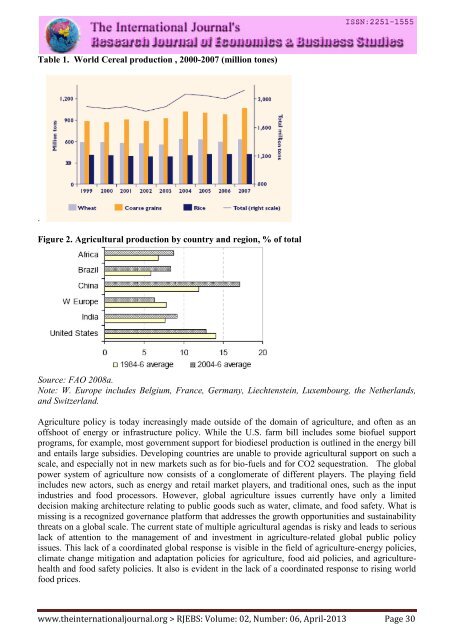Research Journal of Economics & Business Studies - RJEBS - The ...
Research Journal of Economics & Business Studies - RJEBS - The ...
Research Journal of Economics & Business Studies - RJEBS - The ...
- No tags were found...
You also want an ePaper? Increase the reach of your titles
YUMPU automatically turns print PDFs into web optimized ePapers that Google loves.
Table 1. World Cereal production , 2000-2007 (million tones)<br />
.<br />
Figure 2. Agricultural production by country and region, % <strong>of</strong> total<br />
Source: FAO 2008a.<br />
Note: W. Europe includes Belgium, France, Germany, Liechtenstein, Luxembourg, the Netherlands,<br />
and Switzerland.<br />
Agriculture policy is today increasingly made outside <strong>of</strong> the domain <strong>of</strong> agriculture, and <strong>of</strong>ten as an<br />
<strong>of</strong>fshoot <strong>of</strong> energy or infrastructure policy. While the U.S. farm bill includes some bi<strong>of</strong>uel support<br />
programs, for example, most government support for biodiesel production is outlined in the energy bill<br />
and entails large subsidies. Developing countries are unable to provide agricultural support on such a<br />
scale, and especially not in new markets such as for bio-fuels and for CO2 sequestration. <strong>The</strong> global<br />
power system <strong>of</strong> agriculture now consists <strong>of</strong> a conglomerate <strong>of</strong> different players. <strong>The</strong> playing field<br />
includes new actors, such as energy and retail market players, and traditional ones, such as the input<br />
industries and food processors. However, global agriculture issues currently have only a limited<br />
decision making architecture relating to public goods such as water, climate, and food safety. What is<br />
missing is a recognized governance platform that addresses the growth opportunities and sustainability<br />
threats on a global scale. <strong>The</strong> current state <strong>of</strong> multiple agricultural agendas is risky and leads to serious<br />
lack <strong>of</strong> attention to the management <strong>of</strong> and investment in agriculture-related global public policy<br />
issues. This lack <strong>of</strong> a coordinated global response is visible in the field <strong>of</strong> agriculture-energy policies,<br />
climate change mitigation and adaptation policies for agriculture, food aid policies, and agriculturehealth<br />
and food safety policies. It also is evident in the lack <strong>of</strong> a coordinated response to rising world<br />
food prices.<br />
www.theinternationaljournal.org > <strong>RJEBS</strong>: Volume: 02, Number: 06, April-2013 Page 30

















